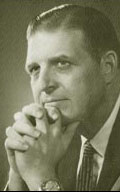 Carl F. H. Henry was born on January 22, 1913. He has only been dead for a few years now (since late 2003), and it’s still a little hard to believe he’s gone. Henry stamped his identity onto some of the central institutions of the evangelical establishment: Christianity Today, the National Association of Evangelicals, Fuller Seminary, the Chicago Statement on Biblical Inerrancy. Generationally, he belongs to what Tom Brokaw calls “the greatest generation,” that age cohort that excelled in building up institutions and shared cultural forms. Henry certainly did his share of that.
Carl F. H. Henry was born on January 22, 1913. He has only been dead for a few years now (since late 2003), and it’s still a little hard to believe he’s gone. Henry stamped his identity onto some of the central institutions of the evangelical establishment: Christianity Today, the National Association of Evangelicals, Fuller Seminary, the Chicago Statement on Biblical Inerrancy. Generationally, he belongs to what Tom Brokaw calls “the greatest generation,” that age cohort that excelled in building up institutions and shared cultural forms. Henry certainly did his share of that.
But as I look through the Carl Henry books on my shelf, I’m struck by how often he played the part of sharp internal critic to the evangelical movement. Especially as a journalist and editorialist at Christianity Today, but pervasively through all his work, Henry was always positioning himself as a watchdog, a prophet, a trend-watcher, and a professional worrier.
His most influential book was probably 1947’s The Uneasy Conscience of Modern Fundamentalism, recently republished by InterVarsity. The word “embarrassment” occurs frequently in it: Henry wrote as a man who was deeply embarrassed that fundamentalist Christians had settled into a posture of disengagement with the problems of the world. Henry had a high view of what classic, conservative Christianity ought to be about in the world, and was disappointed and embarrassed at the failure to rise to that standard. He goaded his readers into re-engagement. On this front, two things were needed: a criticism of fundamentalist failings, and new structures that could do better. Henry set his hand to both tasks.
Important and timely as Uneasy Conscience was, at less than a hundred pages it is dwarfed beside the 3,030 pages of God, Revelation, and Authority, Henry’s bid to put into circulation a comprehensive, academically credible account of the foundations of the Christian faith.
For some time it has been popular –among evangelical academics!– to dismiss Henry’s major work as a rationalistic, proposition-bound approach to theology. That is a caricature, though, and I’ve never been able to recognize the real theology of Carl Henry in it. He certainly did insist on propositions, and was vigilant against any defection from propositional truth, whether existentialist, mystical, neo-orthodox, or postmodern. I confess I haven’t read the whole six-volume set, and I’ve concentrated mostly on the volumes having to do with God rather than revelation. Perhaps that has skewed my perception and predisposed me to think of Carl Henry as someone who had quite a lot to say about God, the Trinity, salvation, and other doctrinal issues more substantive than preliminary. But it just seems wrong-headed to me to think of Carl Henry as somehow reducing revelation to propositions. Did he emphasize the propositional aspect of how God shows himself to us? Yes, he gave it strategic priority of emphasis. It seems like the Bible itself does something similar.
Carl Henry was both a builder of evangelical institutions, and a feisty internal critic. In his builder mode, He signed on to the Chicago Statement, and in his internal critic mode he also generated some of the most helpful warnings about misinterpreting it: “Unbalanced preoccupation with inerrancy can be a costly evangelical diversion.” (GRA vol. IV, p. 365). Evangelical institutions should not exploit the doctrine as “a promotional device for attracting financial support, or a polemical tool for impugning rival institutions…” And most insightfully, “The New Testament supplies no basis for elevating scriptural inerrancy to kerygmatic superprominence. The apostolic core-message does not inject inerrancy into every proclamation of Christ’s incarnation and resurrection, and into the Bible’s proffered alternatives of repentance or judgment. Still less reason exists to revise the Apostle’s Creed by inserting inerrancy as its first article.” (ibid)
Warnings like this are not difficult to find among the 3,030 pages of God, Revelation, and Authority. And there they sit, safely inside Carl Henry’s life project, the overall profile of which is fidelity to the God who stands and stays, in gratitude that he is the God who speaks and shows, in his perfect, inerrant word.